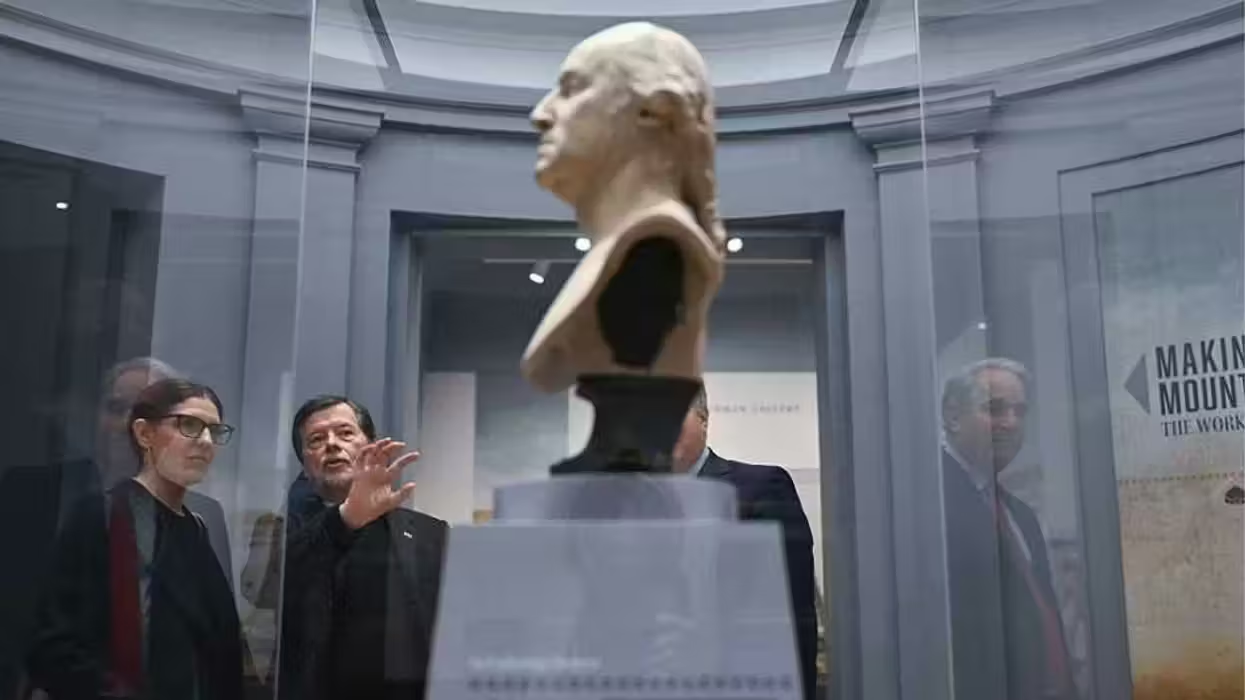
© 2025 Blaze Media LLC. All rights reserved.
The Tokyo Rose chronicles part III: Finding Iva Toguri, two decades later
January 28, 2014
'You should have had complete exoneration.'
In chapter 9 of Miracles and Massacres, Glenn Beck’s latest book, we learn the story of Iva Toguri, aka Tokyo Rose, an American citizen whose life was ruined during World War II after she was prosecuted as a traitor in a political decision made by the U.S. government. One aspect of the story that was left out of the book was how Toguri’s pardoning in 1977 – the last act of President Gerald Ford’s administration, almost three decades after initially being charged as a traitor – came to pass.
In a Blaze Books exclusive, we spoke with Ronald Yates, a former Chicago Tribune journalist, who was responsible for publishing the exposés in 1976 that ultimately helped Iva Toguri gain her pardon, and one of only a handful of people who became a close personal acquaintance with Toguri in her later years. This is our third story in a series based on our interview with him. If you missed it, be sure to check out parts I and II.
While Ronald Yates had helped finally vindicate Iva Toguri, he had still never met the woman, until he received a call from her lawyer in 1991. Yates had spent the majority of his adult life traveling through Asia and Latin America as a foreign correspondent for the Chicago Tribune, and thus had not returned home till 1991.
Iva’s attorney called Yates and said “Iva would like to meet you to personally thank you for what you did and the stories that you wrote. She wants to meet you for dinner. Would you be willing to do that?”
Yates naturally accepted, and during that winter made an appointment to meet with Toguri on the North Side, the same area where some twenty-plus years before the whole story had begun.
 Iva Toguri received an award from World War II veterans group (the American Veterans Committee) in 2006. (Image Source: Human Events)
Iva Toguri received an award from World War II veterans group (the American Veterans Committee) in 2006. (Image Source: Human Events)
As Yates describes the encounter:
“I drove up to the North Side of Chicago after working at the Tribune Tower and I parked my car and I didn’t know what to expect. But as I got to the restaurant door, I saw Iva standing at the door. And I thought, well that’s interesting. So I walked in to the door and she just ran over and she grabbed me and says ‘Oh I just wanted to meet you and thank you and oh my goodness, let’s go sit down at the table and have dinner.’"
And she was really lovely, and very outgoing. Not what I expected. I expected she’d be very shy and withdrawn but she wasn’t and we sat down at that table and we had about a three hour long conversation talking about everything and she was just a wonderfully gracious person.
[sharequote align="center"]You should have had a complete exoneration[/sharequote]
And she said, "I really appreciate what you did." And I said, "Well I felt Iva, I’ve always felt that it was in some ways it was journalists that got you into trouble, and I just hoped it was a journalist who helped get you out of it a little bit, you know even if the pardon doesn’t do you justice. You should have had a complete exoneration." She says "Well a pardon is good enough for me right now. That’s fine." Once again, she was very profuse in her thanks. I didn’t come there for that, but she wanted to make sure that I understood how thankful she was.”
Based on Yates’ relationship with Toguri, I asked him how, if at all, he thinks she would like to be remembered today. He believes
“she wanted to be remembered as a patriotic American, who tried her best to help undermine the Japanese propaganda effort, and to help the American war effort. And of course that’s how she was perceived when she received this award in 2006, the Ed Herlihy award from this American veterans group, WWII American veterans group [American Veterans Center]. That meant a lot to her. I was there when that happened. I was sitting right next to her. And she was so choked up, I mean she got up after she got that award and her tears were just coming down on her face and she said this is so wonderful that you are doing this for me and I never wanted to do anything to harm. I felt I was trying to help and I appreciate this recognition. She was very very grateful for that. The last time I really saw Iva was at that luncheon on the North Side of Chicago in a restaurant, a Japanese-French restaurant, and that meant a lot to her. It meant a whole lot.”
We asked if Yates would talk not just about this experience meeting Iva Toguri, but who she actually was based on their interactions. For very little is known about Toguri the person, given that many of her contemporaries including family members are deceased, and Toguri chose to remain out of the spotlight. So I asked Ronald, who developed a relationship with her over the years, to provide some insights into her personality. Yates said:
[sharequote align="center"]She wanted to be remembered as a patriotic American [who tried to] undermine the Japanese propaganda[/sharequote]
“I tell you something, Iva, she was a small, tiny, woman, but she was really tough. She had an inner toughness. Of course, given what she had gone through, I guess you have to cultivate that or you wouldn’t survive, but she had a very…First of all, she was extremely bright, very smart. She probably would have been a doctor had she not gone to Japan. She was that smart. She would have gone into the medical profession. And she was tough. Smart and tough. Two things that are really tremendous attributes for someone.”
According to Yates, in addition to projecting a colorful and forceful personality that belied her physical meekness, Toguri had a sense of humor and a “unique ability” to put the great tragedies that had occurred in her life in perspective. When discussing the treason conviction:
“She [Iva Toguri] said "I understand what the atmosphere was in America in 1945 and ‘46 and ’47. There were a lot of people who had lost sons, and brothers, and husbands in Asia, fighting the Japanese, so I understand the kind of hatred that existed towards anybody of Japanese nationality." Of course she was an American, she was born in the United States on the 4th of July for Heaven’s sake, so she was not Japanese.”
Not only was Toguri a California native, and an American citizen, but she had worked to help raise the morale of the troops, doing her best to thwart the Japanese officials directing the World War II radio propaganda campaign. But according to Yates:
“people didn’t think of it that way. They looked at her and said she was Japanese so, she understood that there was tremendous hatred towards the Japanese people for what they had done for the war, and for the lives that were lost and so she was very, very careful in her life not to react. She didn’t want to say, "I was treated badly. People shouldn’t hate me. I didn’t do anything wrong." She was not that kind of a person. She just, she had this Japanese sense of "I need to internalize all this. I need to deal with it in my own way. And I will not speak out about it," even though I told her she needed to go on Oprah. She wouldn’t do it. She said "There’s no way I’m gonna do that." I think she was still terrified that a lot of people still hated her, and they might come and do bodily harm to her, you know might throw a bomb in the store or something."
[sharequote align="center"]Of course she was...American, she was born in the United States on the 4th of July for Heaven’s sake[/sharequote]
This was a woman who was born and raised a “100% American” (for example her parents refused to speak Japanese in the home around Toguri), who had travelled to Japan to care of her mother’s ill sister because Iva’s mother herself was too sick to make the trip, eventually leaving Iva stranded in Japan when Pearl Harbor was attacked; who could not be there for her family when her mother died in an internment camp; who refused to renounce her U.S. citizenship in Japan despite abusive treatment and constant interrogations by Japanese officials; who lost her only child during birth; who never again saw her husband after her conviction; who was commended as being better than the dentist she assisted in Alderson, the women’s penitentiary in which she was held in West Virginia, but could never obtain a medical certification to practice because she had lost her citizenship.
Yet according to Yates, “she was not going to allow herself to be put in the position of striking out at those who had wronged her. She decided in her own way that she would internalize this and deal with it, and that’s what she did, for her entire life.”
I asked Yates if Toguri had ever expressed any regrets. Her single regret was for ever agreeing to work with the Major Cousins, Captain Ince and Lieutenant Reyes, who had assured her that they were all going to work together to undermine the Japanese efforts. Yates argues that Toguri’s fatal mistake was perversely in wanting to do something for America.
Perhaps one colorful episode best reflected her patriotic spirit. As Yates tells it:
"In 1942 in March, there was the Jimmy Doolittle raid on Tokyo. “30 Seconds Over Tokyo” it was called, they made a movie about it: in which these B-25s, they just showed the Japanese they could do it. They took off from carriers and they flew over Tokyo and it was really a minor thing. They dropped bombs on whatever sites they could find, whatever military installations or factories they could find, and they flew off and the idea was to fly to China and then escape. Well one of the planes was shot down and a lot of the crew were executed by the Japanese, some of them reached China, but as this was happening, while they were actually flying over the Tokyo, Iva was on the roof of her Aunt’s building, hanging up washing, and she looked up, she heard these airplanes, she looked up and she saw these big planes, and she said ‘I couldn’t believe it. I looked up and I saw the wings and there were these white stars on the wings and I thought oh my G-d, it’s the Americans and we’re coming to attack Tokyo.’"
Well it was the Doolittle Raid and it was over in a matter of 30 seconds, but she was jumping up and down, and yelling, waving at them you know because they were so low and that’s how she was. Of course that caused a lot of problems, the neighbors didn’t like that very much. She was cheering on these B-25s that were dropping bombs on Tokyo, but that’s how she was. I mean she wasn’t afraid to speak her mind. And she did.”
The only time in which perhaps she remained mum was when it came to the government that had betrayed a patriotic American who despite abuse at the hands of the Japanese remained faithful and loyal to her country. For as Yates notes:
“…she harbored no long-term ill will. And I’m sure she must have had some kind of ill will towards the government, but it dissipated over time, and I think she really felt it was time now to put the past behind her, but she didn’t want to talk about it. She never wanted to talk about it very much.”
--
Last in our series: The lessons of Iva Toguri according to Ronald Yates.
Want to leave a tip?
We answer to you. Help keep our content free of advertisers and big tech censorship by leaving a tip today.
Want to join the conversation?
Already a subscriber?
Ben Weingarten is a writer, commentator, and editor at large at RealClearInvestigations. He is a senior contributor at the Federalist and writes columns for Newsweek and the Epoch Times.
Ben Weingarten
Ben Weingarten is a writer, commentator, and editor at large at RealClearInvestigations. He is a senior contributor at the Federalist and writes columns for Newsweek and the Epoch Times.
more stories
Sign up for the Blaze newsletter
By signing up, you agree to our Privacy Policy and Terms of Use, and agree to receive content that may sometimes include advertisements. You may opt out at any time.
Related Content
© 2025 Blaze Media LLC. All rights reserved.
Get the stories that matter most delivered directly to your inbox.
By signing up, you agree to our Privacy Policy and Terms of Use, and agree to receive content that may sometimes include advertisements. You may opt out at any time.






